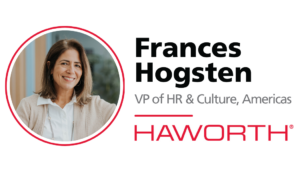In values that have guided the company for decades, TalentFirst member Haworth puts the importance of its global workforce in writing: “We rely on our members.”
 That philosophy goes to work in multiple ways — as when, for example, a Haworth member was going to decline a promotion because the pay raise would make the family ineligible for autism support for their children.
That philosophy goes to work in multiple ways — as when, for example, a Haworth member was going to decline a promotion because the pay raise would make the family ineligible for autism support for their children.
“We carefully considered our current coverage and made a change to nullify the impact of that public assistance cliff,” said Frances M. Hogsten, Haworth’s vice president of Human Resources and Culture – Americas
That example — commonly known as the benefits cliff — represents a dilemma facing many workers across Michigan: Will a raise mean I lose public assistance, leaving my family worse off than before?
It’s a paradox that traps families in poverty, limits employers and stifles the state economy. And it’s why TalentFirst is partnering with the Federal Reserve Bank of Atlanta to promote greater understanding about the impact of these decisions — and the information needed to make them.
Informing decisions
Social safety nets perform a vital function for more than 500,000 Michigan families, helping them meet basic needs such as housing, childcare, transportation, food and healthcare. But they also create unintended consequences: Fear of losing these supports can be a disincentive to accept a new job, promotion, raise, or to work more hours.
Part of the problem is a lack of information by all parties. Public benefit systems are complex, hard to navigate and have varying eligibility thresholds. Not all employers are as proactive as Haworth, nor even aware of the tough economic decisions their workers must make. Employees, meanwhile, often must make those decisions without a good understanding of the impact on their household budget.
We explored these information gaps, and possible solutions, at a recent member-exclusive Spotlight Series discussion. The webinar included a review of an Atlanta Fed initiative, Advancing Careers, designed to address financial disincentives to career advancement.
Hindering workers and employers
Brittany Birken, who co-leads the initiative, gave a real example of a woman who was offered a 10-cent an hour pay raise, equivalent to about $200 a year. That increase would have resulted in the loss of nearly $9,000 in childcare subsidies.
Birken cited a 2021 Alabama survey that found nearly 38% of respondents had declined or delayed taking a new job or promotion because they were afraid of losing government assistance. Employers confirmed this disincentive in a survey by the Florida Chamber of Commerce, which reported that 33% of businesses encountered situations where employees would not accept jobs due to potential loss of benefits.
“We know if we’re able to support career advancement in the long run, it’s going to be far better for families,” Birken said. “But these cliffs can have very real and profound effects that are short-term barriers. If there is a way to navigate through that, the family’s going to be far better positioned because they might be in a career that has natural progression and advancement opportunities.”
The Advancing Careers initiative seeks to mitigate these negative effects. One result has been development of the Career Ladder Identifier and Financial Forecaster, a suite of tools to provide information about benefits loss along a career path.
West Michigan solutions
TalentFirst is partnering with the Atlanta Fed to bring the CLIFF suite of tools and resources to West Michigan.
This project includes forming a community of practice with West Michigan resource navigators, career coaches, and employers to pilot the tools. Case studies will evaluate the impact the tools have on poverty alleviation, employment, career advancement, and economic mobility.
Another important part of the project is raising awareness to show the impact of the benefits cliff regionally.
For example, data shows 1 in 5 Allegan County workers are severely vulnerable to the benefit cliff. County residents with children earning an hourly wage between $10.33 and $16 would be better off refusing a raise — unless the new wage exceeded $26.69 an hour.
Consider an Allegan County woman who is head of a household with two children. She is earning $14.80 an hour but has an opportunity to take a promotion that pays $16.18 an hour. After taxes, that $1.08 raise is equivalent to a $1.13 per hour loss due to reduced public assistance.
Employer supports
TalentFirst also is developing a toolkit for employers to support workers facing these thresholds. This will include recommendations for:
- Wage increases with phased benefit adjustments
- Flexible compensation plans
- Financial literacy training
- Employee Assistance Programs (EAPs) with financial counseling
- Expanded benefits and support programs (childcare, transportation, housing)
- Workforce development and skill-building (upskilling, employer-supported credentialing)
- Benefits to employers include reduced turnover, increased loyalty and retention, improved reputation, better productivity and increased job satisfaction.
More details about these efforts and the CLIFF tool suite initiative will be coming in the months ahead.
‘Ensuring future generations are better off’
At Haworth, the company’s starting wages are generally already above the threshold where most programs drop off.
So, one way the company alleviates the burden of earning more than the cutoff threshold is by offering affordable benefits. The rich design of the benefits plan has premiums well below national benchmarks and below costs at other employers in the region.
The company provides additional support to workers who face other barriers to employment and advancement. This includes partnering with the West Michigan Works! Retention Solutions Network, to help connect Haworth members to community resources.
“As a values-driven organization, Haworth is deeply committed to its members, prioritizing their quality of life beyond legal requirements,” Hogsten said. “Our culture values giving back and ensuring future generations are better off. We proactively support our members to retain them and enhance their overall well-being.”
Free access to resources shared in our Spotlight Series is just one of the benefits of TalentFirst membership. Learn more about our CEO Council and HR Council.


